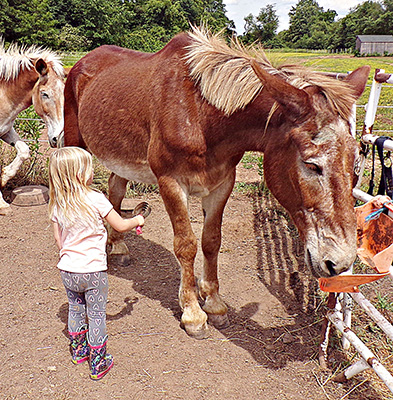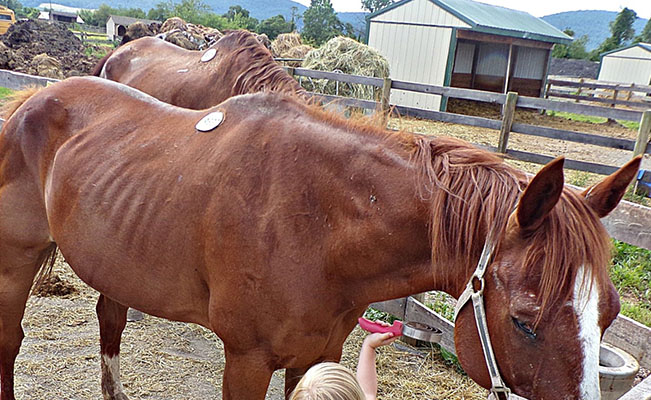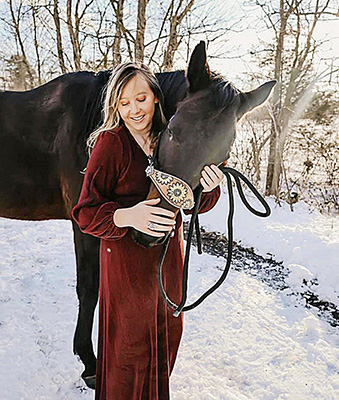Richard D. L. Fulton
There are, on the average, some 200,000 “unwanted” horses in the United States, according to the National Institute of Health (NIH), many of whom are slaughtered and sold for their meat, are saved by rescue facilities, or are given sanctuary on federal lands.
So how do these horses end up “unwanted?” The Unwanted Horse Coalition reports that, generally, unwanted horses include “horses which are no longer wanted by their current owner because they are old, injured, sick, unmanageable, fail to meet their owner’s expectations, or their owner can no longer afford them,” among various other causes.
Abandonment of a horse generally applies to transporting the animal off the owner’s property and leaving it at some other location. Some abandonments—the lucky ones—have even been found mingling with horse herds on other farms.
Animal cruelty generally entails inflicting harm upon a horse. In some cases, animal cruelty can go hand in hand with neglect. Neglect of a horse refers to simply not providing good, humane care of the animal. An example occurred in Maryland a number of years ago in which more than 100 horses were seized from a Maryland farm where investigators also found the scattered, skeletal remains of more than 25 dead horses.
Horses removed by law enforcement are considered seizures, and the rescued horses who do not need to be euthanized can be turned over to horse farms who accept them.
In Maryland, the aforementioned offenses are considered misdemeanors, but the degree of the offenses may vary from state to state.
Many horses are surrendered, meaning their owners do not or cannot continue to care for or keep the horses. There are many horse farms and rescue operations who will accept surrendered animals. In addition, the federal government provides sanctuary to unwanted animals and 100,000 unwanted horses are maintained on land owned by the Bureau of Land Management, according to the NIH.
As if the above-mentioned circumstances were not traumatic enough for the horses, there is actually a worse fate that awaits many.
According to the NIH, 82,000 to 150,000 “unwanted” horses are annually sold and transported out of the United States to Mexico and Canada to be killed, butchered, and sold on the global horse meat markets.
While the federal government in the United States has issued bans on killing, slaughtering, and selling horse meat in this country, they have not actually codified any prohibitions by law.
Horses turned over by their owners for sale for their meat are kept in “kill pens,” awaiting buyers for shipment primarily to Canada and Mexico, where the horses are killed and slaughtered and sold overseas or shipped live to be killed and slaughtered in other countries. “Kill pens” are, according to wildhorseproject.org, “the worst environment for determining the future of a disenfranchised horse.”
From there, the sold horses are trucked to Canada or Mexico, all bets are off as far as treating the doomed animals. Hanaeleh, a non-profit organization dedicated to the welfare of horses, notes that in some cases in Mexico, “horses are repeatedly stabbed with ‘puntilla’ knives until they bleed to death. In Canada, the horses are hit with ‘captive bolts’ which are supposed to kill the horses immediately. Unfortunately, these bolts were designed to slaughter cows, not horses, and the horses often have to be hit repeatedly, causing them extreme pain and suffering.”
Individuals can help save “unwanted horses” by donating cash and/or volunteering at local sanctuaries to help with grooming, rehabilitating, or any number of other tasks. Several local facilities include: Izzy’s Love Equine Rescue, a 501(c)(3) nonprofit rescue located at 9739 Dry Bridge Road in Emmitsburg. Deborah Dempsey owns the facility and is assisted by her daughter, Izzy, for whom the sanctuary was named. The operation may be contacted at 410-903-3303.
Life Horse Inc., a 501(c)(3) nonprofit organization located at Breezy Hill Stables, 15117 Mud College Road, Thurmont, is operated by Vice-President Elizabeth Walker and President Joseph Topper. The operation may be contacted at 240-674-3856.
Rocky’s Horse Rescue and Rehabilitation, Inc, located in Thurmont, is a 501(c)(3) nonprofit, and is operated by President Sharon Burrier and Vice-president Danny Burrier. The facility may be contacted at 240-367-7256.

Reese Topper, 4, daughter of Life Horse management Elizabeth Walker and Joseph Topper, grooms rescued mule, Bert.

Rescued “kill pen” horses with auction tags.

Izzy Dempsey is shown with rescue, Stephanie.

